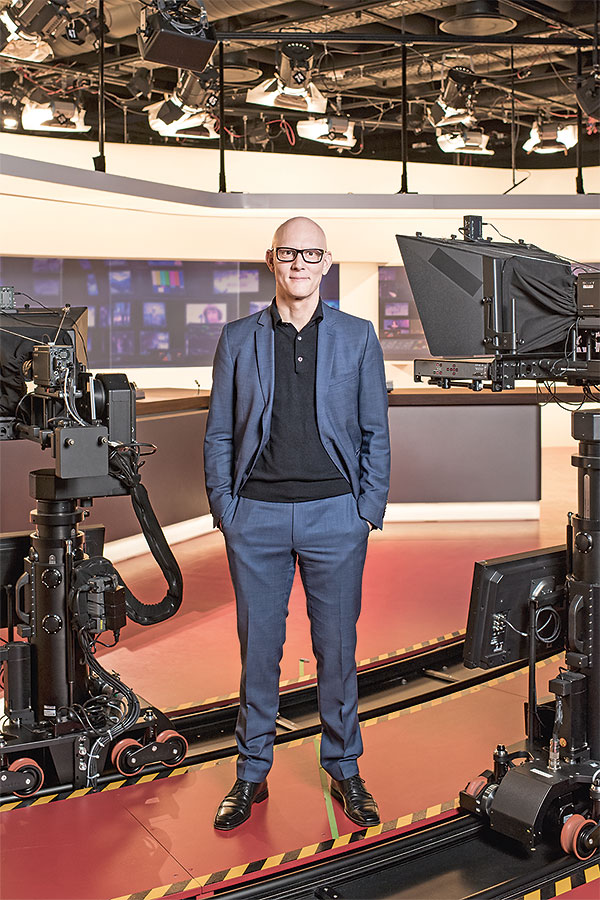Talking about language
Text: Sarah Schupp
Martin Luginbühl is a language enthusiast. His passion as Professor of German Studies is for applied linguistics – such as language use in the media.
Never really a bookworm, Martin Luginbühl has however been fascinated by language since he realized the huge impact words can have as a young boy in Schaffhausen. “In a family of three children, there is always a lot of talking and verbal negotiation. And because, as the youngest, I was seldom able to physically defend myself against my siblings, I practiced verbal resilience,” he says with a smile. He later decided to study German in Zurich – where he still lives with his family – drawn initially by ideas of grammar and syntax. While at university, however, Luginbühl learned about applied linguistics and entered a previously unknown linguistic world. From that point on, he focused intensively on the use of language in specific contexts and on observing authentic communication.
Constructing reality
Around a year ago, the 47-year-old academic moved into his office in the German department on the idyllic Nadelberg in Basel, where he researches and teaches media linguistics and conversational analysis. In fact, he is less interested in language as a system of signs than in its effect on social interaction and its use for specific purposes. Media linguistics is the perfect way to answer these questions. In his doctoral dissertation, Gewalt im Gespräch (Conversational Violence), Luginbühl examined the effects of linguistic behavior on “Arena”, a TV political debate program. Subsequently, he researched the linguistic construction of media reality: “This looks at aspects such as how information changes as it passes through media processes – from a press conference to a media release through to radio, TV, and newspaper reports,” he explains.
Watching the daily news
When talking to Luginbühl, it quickly becomes clear that he is particularly interested in TV news programs and the way in which they present information to the public as authentic reality. He was surprised by the findings of his analysis on the historic development of the ’Tagesschau’ daily news program on the channel SRF: In the beginning, in the 1950s, two thirds of its segments were a mixture of information and entertainment. For example, the news shows broadcast a piece on a ballerina who performed with a tiger – “pure entertainment.”
Over the next 20 years, newsreaders became very sober and distanced, as Luginbühl’s analyses show. In the 1980s and 1990s, he noted another clear paradigm shift in reporting: The earlier newsreaders were replaced by presenters who created an emotional and local connection with the audience; correspondents were shown directly at the scene of the action. Luginbühl explains that, currently, correspondent reports are again showing a tendency toward sober, factual language, while introductions remain entertaining and dynamic. “The history of ’Tagesschau’ isn’t a continuous evolution toward more entertainment; it’s more of a wave-like movement.”
With research like this, Luginbühl is tackling the overarching question of how journalistic culture expresses itself through language – and how it is created by language in the first place. Interdisciplinary media linguistics enable an holistic approach by considering linguistic elements such as word choice and sentence structure as well as topic development, links between language and images, and intonation.
We are surrounded by media every day and everywhere. Is it even possible for a media linguist to switch off ? “There is probably an aspect of ’déformation professionelle’,” Luginbühl admits. “I can’t consume any mass-media product without also analyzing it. Sometimes, I’m not even sure whether I’m working or just being myself.” So it’s no wonder that many of the examples in his lectures are taken from his daily interactions with media. There is only one medium that allows him to sit back and relax: “I can only truly switch off in the cinema – I become totally engrossed in the movie and immerse myself in fictional worlds.”
Luginbühl is passionate about teaching the theoretical background to linguistics. He began sharing knowledge shortly after graduation and spent 13 years teaching high-school German while continuing to research. This was an important additional string to his bow: “Positions at universities for early career researchers are fixed-term and don’t allow you to plan for the long term. As the father of two children, I was particularly keen on job security,” he explains. He always enjoyed teaching and collaborating with pupils, and still has an interest in new teaching methods.
In 2003, Luginbühl decided to concentrate fully on an academic career. One year later he moved to the USA thanks to a scholarship from the Swiss National Science Foundation. He spent two years in San Diego comparing the composition of media reality on the ’Tagesschau’ and CBS Evening News programs. Back in Switzerland, he increasingly dedicated himself to his second passion: Examining the role speech plays in teaching and as a learning objective. He is currently expanding this research as part of a project on the development of verbal argumentation skills in Swiss school children. “These findings can feed directly back into practice and be used for self-reflection,” Luginbühl says.
Whether media linguistics or conversational analysis, both fields of research in such “hyphenated disciplines” feed Luginbühl’s fascination for the meaning of language in social interaction and in connection with other, non-linguistic aspects. Still, he does not restrict his academic work to a specific method or question: “My curiosity doesn’t stop at the boundaries of linguistics – and that is precisely what makes my research so exciting.”
Martin Luginbühl was born in 1969 and studied German language, literature, and history at the University of Zurich, where he obtained his doctorate in 1998. He worked as a part-time high school teacher alongside his academic work. Before his appointment in Basel, he was a Professor of German Linguistics at the Université de Neuchâtel.
More articles in the current issue of UNI NOVA.

